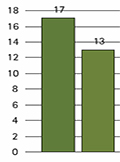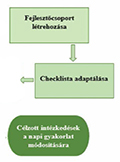The eLitMed.hu medical portal uses computer cookies for convenient operation. Detailed information can be found in the Cookie-policy.
Journal of Nursing Theory and Practice - 2018;31(02)
Content
[The Florence Nightingale Medal - Its History and the Hungarian Connection]
[Apropos of the International Nurses Day, authors discuss Nightingale’s impact on the development of nursing and her role in international nursing history. They consider as one of the main achievements of Nightingale that she raised the profile of nursing to an appreciated profession, thereby contributing to modifying the widely held view on women’s role in society in Hungary, too. After reviewing the developments related to the educational empowerment of women in the Hungary of the 19th century they suggest that these changes as well as awakening of the nation might explain the decision of the Hungarian Red Cross Society to table a motion at the 8th International Conference of Red Cross Societies in London with a view to establishing a medal in honour of Florence Nightingale. The Hungarian proposal was approved by the international conference in Washington in 1912 and a resolution was passed to institute the Florence Nightingale Medal. ]
[The psychological Well-being and Burnout among Ambulance Personnel]
[The aim of the study: The aim of the presented study was to investigate the psychological well-being and burnout among ambulance personnel of the Hungarian National Ambulance Service. Our goal was to identify the ambulance specific stressors that negatively affect the psychological health of personnel and lead to burnout. Material and method: The quantitative, cross-sectional study included 1979 ambulance personnel. Level of burnout was measured by Pines-Aronson Burnout Inventory. SPSS version 17.0 was used for statistical analyses. Types of analyses included Khi square test, ANOVA and correlation analysis. Level of significance was defined at p<0.05. Results: The 40% of ambulance personnel are affected by job-related stressors. The heightened and constant state of readiness does not let time for discussing work-related experiences. There was significant correlation between burnout level, years worked at NAS, and the evaluation of workplace circumstances and climate. Conclusion: Due to the results of the present study we created different possibilities of prevention and intervention that can help handle the symptoms of burnout among ambulance personnel.]
[Quality of Life of Cancer Patients’]
[Aim of the study: This research is the part of an extended examination. It’s aim is to assess the cancer patients’ quality of life, how the diseas effects in the way of life, and also the psychologycal burden of the patients. Furthermore to assess the patient’s knowledge of their desease. Material and Methods: The research is descriptive, empirical, supplemenary, which in nurses and patients in oncology departments of Hondvéd Hospital in Budapest and Bács-Kiskun County Hospital in Kecskemét were attend. The method of the survey was an individual questionnaire. The evaulation of the results made with MS Excel and SPSS. The complete evaluable questionnaire’s rate is 74,9% (N=131). Results: the patients judge their own health and quality of life to low in a rate of 56,6%, and 75% of them stated that their way of life and their daily routin has changed in a significant extent. 50% of the responders described their actual emotional condition with a negative indicative, and also occur different psychic disfunctions amuong them. For example the depression in a rate of 17,5%, anxiety is in 18,5%, and reduced self-evaluation in 14,1%. A significant majority (76,3%) of respondents don’t possess the appropriate knowledge. Conclusions: The disease effect on cancer patients’ way of life and quality of life in a significant way. Patients are exposed to a significant psycholigycal burden. ]
[Nurses Knowledge and Tasks of real Time Evacuation of Inpatient Care Institutions]
[In our modern, globalized world, there is a significant increase in the number of events requiring immediate action where coordinating the rescue, health care and placement of several people at the same time. Unfortunately, we can count not only on international, but domestic relations, for various mass disaster threats and events, whether it is a natural disaster or a different form of artificial disaster. It is of the utmost importance to treat such a qualified situation in inpatient care and health care institutions, where there is a large number of patients and caregivers with limited self-reliance and movement. Although it is important to emphasize the importance of disaster prevention in the domestic context, in cases requiring immediate and rapid intervention, there is a great deal of responsibility and responsibility for nursing staff. By questionnaire surveys, we investigated the catastrophic and evacuation knowledge of inpatient care nurses and the system and method of acquiring these skills. After the results were processed, we concluded that our assumptions proved that the knowledge of the target group in question was very incomplete. In order to increase efficiency, we consider it of the utmost importance to develop a procedure based on unified principles but to adapt to the local conditions of the given institution and to develop its ability-based education system. ]
[Safe Handover - Opportunities to improve Patient Handover]
[Mistakes, errors made in the patient handover process can result in severe outcomes, but with appropriate measures it is possible to decrease their numbers. Therefore, we considered it important to develop a methodology which would help us analysing our internal processes. Getting to know the current situation well provides the opportunity to implement those changes into our daily work which focus on the actual problems, and which could lead to measurable improvements in our everyday work processes. ]
1.
Clinical Neuroscience
[Headache registry in Szeged: Experiences regarding to migraine patients]2.
Clinical Neuroscience
[The new target population of stroke awareness campaign: Kindergarten students ]3.
Clinical Neuroscience
Is there any difference in mortality rates of atrial fibrillation detected before or after ischemic stroke?4.
Clinical Neuroscience
Factors influencing the level of stigma in Parkinson’s disease in western Turkey5.
Clinical Neuroscience
[The effects of demographic and clinical factors on the severity of poststroke aphasia]1.
2.
Clinical Oncology
[Pancreatic cancer: ESMO Clinical Practice Guideline for diagnosis, treatment and follow-up]3.
Clinical Oncology
[Pharmacovigilance landscape – Lessons from the past and opportunities for future]4.
5.







